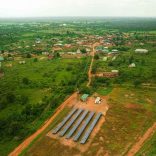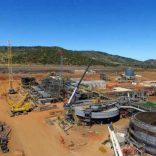Mozambique: Minister Pale in Japan, reaffirms country's commitment to power generation projects
Mozambique plans 6th licensing round / Africa ‘stepping on gas’ as liquids lose pace

File photo / Change of pace: for African energy production
Liquids output from African producers including Nigeria and Angola is set to be slashed in half by 2030 due to drastic exploration cutbacks and governments need to offer improved fiscal terms to boost investment, according to Wood Mackenzie.
The research consultancy forecasts upstream investment in sub-Saharan Africa will be cut by $100 billion over the next five years as the two West African countries have already borne the brunt of capital expenditure cutbacks in deep water due to its high break-even price relative to other sectors.
“Exploration cuts in the region will also contribute to a longer-term production slump as explorers have shied away from greenfield prospects, in favour of appraising known discoveries,” said WoodMac’s senior research manager for sub-Saharan Africa, Femi Oso.
As a result, regional production of crude and other liquids is predicted to decline to 2.6 million barrels per day by 2030 from the present level of 4.8 million bpd – a drop of 46%.
“Governments in sub-Saharan Africa need to revive the upstream oil and gas industry by offering attractive fiscal terms rather than look to increase state revenues in the current climate,” the analyst added.
The Edinburgh-based firm does though see a “slow recovery” in regional exploration as operators benefit from cost deflation – for example, on rig dayrates – and efficiency improvements through more streamlined project design.
It stated ExxonMobili’s recent deep-water Owowo discovery off Nigeria shows the play still offers resource potential and expects better-financed explorers will take calculated risks to stimulate exploration.
Furthermore, continued low oil prices may also lead to increased merger & acquisition activity as oil companies opt to divest non-core assets, with Mozambique, Angola and Nigeria offering the most deal opportunities “for players with deep pockets”.
While liquids output may be on the wane, the continent’s gas sector is expected to take off on the strength of major discoveries off East Africa totalling more than 168 trillion cubic feet by the likes of Eni, Anadarko Petroleum and Statoil, according to WoodMac.
The firm stated various gas export projects – mainly in Mozambique and Tanzania – that are awaiting final investment decision have “resilient economics and will transform the global LNG market”.
“Mozambique and Tanzania’s LNG projects have remained relatively unscathed by cuts and will be timed to align with global liquefied natural gas demand growth to achieve a better price,” Oso said.
“The projects will appeal to buyers looking to diversify their portfolios and BP has already committed to offtake all volumes from Eni’s Coral FLNG.”
Ophir Energy is also looking to develop its Fortuna LNG project off Equatorial Guinea where costs have now been halved to around $450 million, enabling it to take a final investment decision with or without partners.
There have also been significant recent gas finds in frontier basins such as the Senegal-Bove in Mauritania and Senegal.
As a result, gas production from sub-Saharan Africa is expected to more than double from the present level of 6 billion cubic feet per day to 13 Bcfd in the next decade.
The use of floating gas liquefaction facilities is seen as “a simpler and less expensive alternative” to onshore LNG plants that are presently the preferred way to monetise gas, according to Oso.
Floating storage and regasification units that serve as import terminals, as well as piped gas supply to the power sector, are also expected to play an increasingly important role in the longer term as demand increases from domestic markets.
Meanwhile, Mozambique’s National Petroleum Institute plans to launch the country’s sixth oil and gas licensing round in late 2017 or in 2018, with potential bidders to nominate areas of interest and Schlumberger to shoot a multi-client 3D seismic survey in the Angoche area.
By: Steve Marshall













Leave a Reply
Be the First to Comment!
You must be logged in to post a comment.
You must be logged in to post a comment.